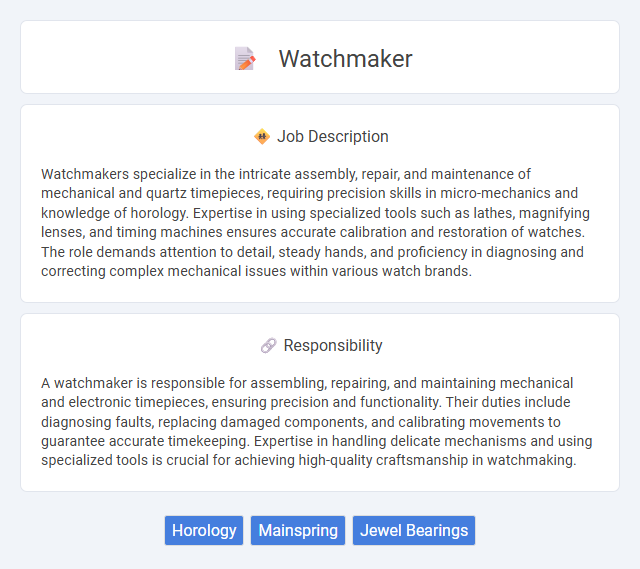
Watchmakers specialize in the intricate assembly, repair, and maintenance of mechanical and quartz timepieces, requiring precision skills in micro-mechanics and knowledge of horology. Expertise in using specialized tools such as lathes, magnifying lenses, and timing machines ensures accurate calibration and restoration of watches. The role demands attention to detail, steady hands, and proficiency in diagnosing and correcting complex mechanical issues within various watch brands.
Individuals with strong attention to detail and steady hands are likely to be well-suited for watchmaker jobs. Those who have patience and fine motor skills may find success and satisfaction in this profession. However, people with poor eyesight or limited manual dexterity might face challenges in performing watchmaking tasks effectively.
Qualification
Watchmakers require advanced technical skills and precision craftsmanship, typically gained through formal training programs or apprenticeships. Proficiency in using specialized tools and understanding intricate mechanical movements is essential for repairing and assembling timepieces. Strong attention to detail and steady hands are critical qualifications for ensuring the accuracy and longevity of watches.
Responsibility
A watchmaker is responsible for assembling, repairing, and maintaining mechanical and electronic timepieces, ensuring precision and functionality. Their duties include diagnosing faults, replacing damaged components, and calibrating movements to guarantee accurate timekeeping. Expertise in handling delicate mechanisms and using specialized tools is crucial for achieving high-quality craftsmanship in watchmaking.
Benefit
Watchmakers likely enjoy benefits such as the opportunity to work with precision instruments that enhance their technical skills and attention to detail. The profession probably offers a steady demand for skilled craftsmanship, creating potential job stability and niche market opportunities. Specialized knowledge in watch repair and assembly might also lead to competitive compensation and potential career advancement within luxury goods or horology industries.
Challenge
The watchmaker job likely involves intricate challenges that require exceptional precision and attention to detail. Dealing with tiny, delicate components suggests a high probability of encountering issues related to mechanisms and timing accuracy. Solving these technical problems demands strong problem-solving skills and steady hands to ensure the watch functions perfectly.
Career Advancement
Watchmakers with advanced skills in micro-mechanical repairs and luxury timepiece restoration often progress to senior technician or master watchmaker roles, commanding higher salaries. Specializing in high-end brands or complications such as tourbillons and chronographs can open opportunities in boutique dealerships or authorized service centers. Continuing education and certification through bodies like the American Watchmakers-Clockmakers Institute significantly enhance career growth prospects.
Key Terms
Horology
Watchmakers specialize in horology, the intricate science and art of designing, manufacturing, and repairing timepieces such as wristwatches and clocks. Mastery in mechanical movements, precision engineering, and fine motor skills are essential to assemble and calibrate complex mechanisms for accurate timekeeping. Expertise in horological tools and technologies is crucial for diagnosing faults, restoring vintage watches, and crafting bespoke components.
Mainspring
A watchmaker specializing in mainsprings meticulously crafts and repairs this critical component, which stores and releases energy to power mechanical watches. Precision and expertise are essential for adjusting mainspring tension to ensure accurate timekeeping and longevity of the watch movement. Mastery over mainspring calibration directly impacts the reliability and performance of high-quality horological instruments.
Jewel Bearings
Watchmakers rely heavily on jewel bearings to enhance the precision and durability of mechanical timepieces. These synthetic sapphire or ruby bearings reduce friction between moving parts, ensuring smooth gear movement and extending the watch's lifespan. Precision in installing jewel bearings is critical for maintaining accurate timekeeping and minimizing wear in high-quality watches.
 kuljobs.com
kuljobs.com